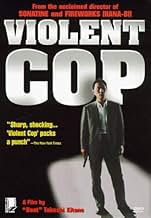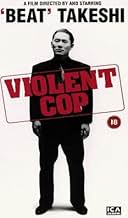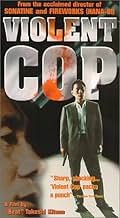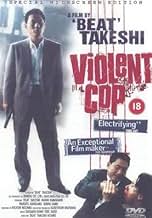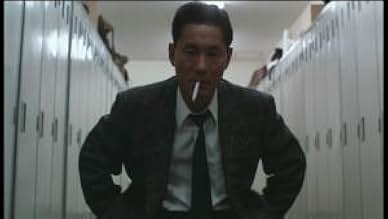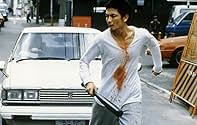A violence prone police officer discovers that his colleague is trafficking drugs.A violence prone police officer discovers that his colleague is trafficking drugs.A violence prone police officer discovers that his colleague is trafficking drugs.
- Director
- Writers
- Stars
- Awards
- 3 wins & 1 nomination total
Takeshi Kitano
- Azuma
- (as Beat Takeshi)
Sei Hiraizumi
- Iwaki
- (as Shigeru Hiraizumi)
- Director
- Writers
- All cast & crew
- Production, box office & more at IMDbPro
Featured reviews
Yes, it´s true: all the real great movies of the 1990s seem to be produced in the land of the rising sun! This dark cop thriller is no exclusion, because "Violent Cop" is suspense-packed, dramatic, sinister - and the actors don´t say a word too much! The dark poetry often reminded me on the films of Paul Schrader or Abel Ferrera as well as the visual brilliance and the excellent cinematography this Japanese gem contains! And, of course, main actor Takeshi Kitano is the new God of Eastern cinema! Masterpieces like "Brother" or "Hana Bi" blew my mind, and his performance of the emotional broken cop is powerful and amazing! A highly recommended film!!!
Kitano cripples the senses and jars the nerves in his films. This is a movie about a two-fisted cop whose blunt face and cliff's edge personality drive every scene, even the ones Kitano is not in. Kitano's character is not reacting to a violent world, but infecting it with his own brand of violence. The "violent cop" has lost his hope, therefore he fears nothing.
Kitano as director gives us a real world of humor and interaction. Events happen, there's no plot. Every scene has this pulse that is raging, the characters even when still seem kinetic as sprinters. Punches, kicks, and bullets explode bodies. Kitano's character clashes with a psychotic hit man, but it is Kitano's cop who is out of control, unstoppable in his desire to inflict justice as he sees it.
There's scenes which cannot be forgotten: Kitano's cop
interrogates a punk drug dealer in a club rest room. These two actors go through a scene in which Kitano slaps this man over and over until he talks. The difference is that Kitano is really slapping this actor, and slapping living hell out of him. Cringe-worthy, and up there with one of the other scenes that illustrates what a hard man Kitano is: stabbed with a knife, Kitano grips the blade as it comes out of him, clinching his fist down on it so he cannot be stabbed again. Blood pours out from between his fingers, he cannot let it go because his fist and knife are one; Kitano understands the brutality of the fight, the reality of two men trying to kill each other, no quips, no words, no yells or curses, just blood and rage; cut to the bone, it's the way the whole film makes you feel.
As far as the recent BROTHER is concerned, it makes perfect sense for Kitano to use similar themes seen in his earlier films. BROTHER is Kitano's first real attack on American audiences. They, en mass, haven't seen his stuff, and if Kitano's going over old ground, he's doing it in HIS style. Better a retread Kitano than most of Hollywood's slobbering star-cramped idiocy.
Kitano as director gives us a real world of humor and interaction. Events happen, there's no plot. Every scene has this pulse that is raging, the characters even when still seem kinetic as sprinters. Punches, kicks, and bullets explode bodies. Kitano's character clashes with a psychotic hit man, but it is Kitano's cop who is out of control, unstoppable in his desire to inflict justice as he sees it.
There's scenes which cannot be forgotten: Kitano's cop
interrogates a punk drug dealer in a club rest room. These two actors go through a scene in which Kitano slaps this man over and over until he talks. The difference is that Kitano is really slapping this actor, and slapping living hell out of him. Cringe-worthy, and up there with one of the other scenes that illustrates what a hard man Kitano is: stabbed with a knife, Kitano grips the blade as it comes out of him, clinching his fist down on it so he cannot be stabbed again. Blood pours out from between his fingers, he cannot let it go because his fist and knife are one; Kitano understands the brutality of the fight, the reality of two men trying to kill each other, no quips, no words, no yells or curses, just blood and rage; cut to the bone, it's the way the whole film makes you feel.
As far as the recent BROTHER is concerned, it makes perfect sense for Kitano to use similar themes seen in his earlier films. BROTHER is Kitano's first real attack on American audiences. They, en mass, haven't seen his stuff, and if Kitano's going over old ground, he's doing it in HIS style. Better a retread Kitano than most of Hollywood's slobbering star-cramped idiocy.
I find it very difficult to rate a movie like this, as most of its interest is in who made it and how it points to his much superior later movies like Hana-bi. The script here is obviously just a standard actioner - the usual elements we've all seen a million times are there, the hard man cop with his innocent rookie partner, his one weakness (in this case, his sister), his 'no nonsense get things done attitude'. But this being Kitano, its full of mysterious, compelling scenes that in themselves often don't often make sense. The ending was never really in doubt, but the fascination of Takeshi movies is how he gets there. There really is nobody out there making movies quite like him now - such weird blends of Japanese sensibility, American action tropes and European art movie editing and camera-work. It shouldn't work, but somehow it does. Violent Cop is nowhere near his best work so I wouldn't recommend it to anyone curious about watching it, but its certainly worth a view for those who have seen his later movies and want to explore his strange vision of the world.
The first 10 mins of the film already tell you what Takeshi Kitano is up to - we see a homeless man eating peacefully and enjoying the foods beside his make-shift home in a park. Suddenly his bowl is hit by a football, and then a gang of teenagers rough him up, giggling while beating up the man mercilessly until he loses conscious. Then all the kids return to their safe middle-class homes.
Kitano, the "violent cop", sees the whole thing, but he doesn't stop the kids right away. Instead, he follows one to his home, shows the kid's mother his police ID, walks up to the kid's room and starts kicking and snapping him, demanding the boy to give himself up to the police tomorrow. To me, the movie more or less ends there. The plot then moves on to the usual good-cop corrupted-cop routine, involving a sub-plot on Kitano's retarded sister. To sum up, the storyline is actually very predictable and fails to create any suspended and dramatic tension.
This is where "Violent Cop" departs from other movies of the same genre - Kitano's violence is raw and real, and he wants to show you in yer face. Unlike the highly stylized and cartoonish violence of John Woo (anything who knows a bit about guns can tell you that you cannot fire a few rounds of bullets from two guns with both hands at the same time when you're jumping off a car), for example, Kitano shows the essence of violence and how it actually affects people, both physically and psychologically.Violence, in the world of Kitano, can come suddenly, aimlessly and randomly, and no one is safe!
"Violent Cop" is an excellent movie on all counts, and Kitano (in both directing and acting) can only go above it in, IMHO, Hana-Bi.It's kind of sad (as a big fan of Kitano) to see him going back to making new movies like "Brothers", a replica in spirit (if not in actual storylines) of his early stunning successes like this one and Hana-Bi. He's actually very good in "Gohatto", and fans like me want him to know that he should try more new things.
Kitano, the "violent cop", sees the whole thing, but he doesn't stop the kids right away. Instead, he follows one to his home, shows the kid's mother his police ID, walks up to the kid's room and starts kicking and snapping him, demanding the boy to give himself up to the police tomorrow. To me, the movie more or less ends there. The plot then moves on to the usual good-cop corrupted-cop routine, involving a sub-plot on Kitano's retarded sister. To sum up, the storyline is actually very predictable and fails to create any suspended and dramatic tension.
This is where "Violent Cop" departs from other movies of the same genre - Kitano's violence is raw and real, and he wants to show you in yer face. Unlike the highly stylized and cartoonish violence of John Woo (anything who knows a bit about guns can tell you that you cannot fire a few rounds of bullets from two guns with both hands at the same time when you're jumping off a car), for example, Kitano shows the essence of violence and how it actually affects people, both physically and psychologically.Violence, in the world of Kitano, can come suddenly, aimlessly and randomly, and no one is safe!
"Violent Cop" is an excellent movie on all counts, and Kitano (in both directing and acting) can only go above it in, IMHO, Hana-Bi.It's kind of sad (as a big fan of Kitano) to see him going back to making new movies like "Brothers", a replica in spirit (if not in actual storylines) of his early stunning successes like this one and Hana-Bi. He's actually very good in "Gohatto", and fans like me want him to know that he should try more new things.
There is no doubt in my mind that Takeshi Kitano is one of the greatest cinematic geniuses alive, and his nihilistic 1989 directorial debut is a fantastic proof for that. "Sono otoko, kyôbô ni tsuki" aka. "Violent Cop" is one of the rawest, most uncompromising cop films ever made, and, at the same time, arguably one of the most promising debut films ever delivered. Due to its 'unorthodox cop' premise, the film is often compared to films like the "Dirty Harry" series or "Bad Lieutennant". The stone-faced and irascible copper Azuma (brilliant performance by director Kitano, under his acting name 'Beat Takeshi'), is ten times dirtier than Harry ever was and incomparably more ruthless than the Baddest New York Lieutennant. Azuma could even give the ultra-unorthodox coppers in 70s Italian Poliziotteschi flicks a lesson in police violence. At least most violent cops in 70s exploitation cinema did what they did to protect society from scumbags, whilst Azuma does it out of anger, and he does not even bother asking questions before beating confessions out of criminals. Honestly, "Violent Cop" beats everything in the copper-flick field in its incredibly nihilistic premise, and yet it finds the time for slower moments, and Kitano's typically absurd and ingeniously black humor.
Detective Azuma (Kitano), and irascible homicide detective hates the criminal as he hates the crime, and he does not attempt to hide this attitude. His unorthodox methods, which include the severe beating of suspects, have caused him trouble with his superiors in the past, but Azuma does not seem to care. When ruthless Yakuza gangsters make things personal, they have to realize that they might have made an enemy whose relentlessness easily equals theirs...
I would love to further discuss the film's ingenious plot, but I do not want to spoil anything, as every true film lover should be able to experience the greatness of "Violent Cop". Unlike Kitano's other films, for which Kitano himself wrote the stories, this film is an adaptation of a novel by Hiashi Nozawa. Kitano's work, however, is ingenious, as screenwriter, director and leading man of this film. There is no other director who is capable of combining brutal nihilistic violence, tragedy and (black) comedy as effectively as Kitano does. Asked about the violence in his films in an interview, Kitano himself has once stated that nobody could possibly want to reproduce the violence seen in his films, simply because it is painful to look at. And it is true, hardly another director makes the pain caused by the violence as obvious as Kitano does. Kitano has a unique stamina when showing violence, which makes the viewer almost feel the pain. I don't want to spoil anything by giving an example - see this film and know what I am talking about. At the same time Kitano always has moments that are absurdly comical. As all Kitano protagonists, Azuma, even though an irascible and violent man, has a very odd sense of humor. His response to a barmaid's question what he does for a living is just one example for that. Also in a typical Kitano-manner, the film takes the time for slower parts in-between, like Azuma crossing a bridge for example.
Kitano is as great as leading man as he is as director here. His stoic performance as Azuma is brilliant. The stone-faced copper always has a poker face, but it is nonetheless obvious that he is boiling in fury - how many other actors could be predestined for a role like this as Kitano is. No one, in my opinion. It is Kitano's performance which carries this film, and yet the other performances are also excellent. Hakuryu is particularly excellent as a sadistic Yakuza hit-man. Maiko Kawakami is also very convincing as Azuma's mentally disturbed sister. The rest of the cast includes several great character actors who have since become regulars in Kitano's films, such as Ittoku Kishihe as a Yakuza boss or Makoto Ashikawa as Azuma's young colleague. Lovers of Italian cult-cinema, by the way will be delighted to see a scene in which Kitano brilliantly pays tribute to Sergio Martino's Giallo "La Coda Dello Scorpione" (1971). "Violent Cop" is greatly shot and accompanied by an insanely brilliant score. Kitano's use of music in his films is another part of his brilliance, and really has to be experienced instead of explained.
All said, "Violent Cop" is a unique cinematic experience that must not be missed. Ultraviolent, nihilistic, sometimes slow in detail and more often fast and incredibly raw, brutal, sometimes tragic and sometimes oddly comical, this is the uncompromising masterpiece that marks the beginning in the cinematic career of one of today's most brilliant filmmakers. And, apart from his unmatched 1997 masterpiece "Hana-Bi" (aka. "Fireworks"), Kitano's debut still ranks among his greatest accomplishments. A true must!
Detective Azuma (Kitano), and irascible homicide detective hates the criminal as he hates the crime, and he does not attempt to hide this attitude. His unorthodox methods, which include the severe beating of suspects, have caused him trouble with his superiors in the past, but Azuma does not seem to care. When ruthless Yakuza gangsters make things personal, they have to realize that they might have made an enemy whose relentlessness easily equals theirs...
I would love to further discuss the film's ingenious plot, but I do not want to spoil anything, as every true film lover should be able to experience the greatness of "Violent Cop". Unlike Kitano's other films, for which Kitano himself wrote the stories, this film is an adaptation of a novel by Hiashi Nozawa. Kitano's work, however, is ingenious, as screenwriter, director and leading man of this film. There is no other director who is capable of combining brutal nihilistic violence, tragedy and (black) comedy as effectively as Kitano does. Asked about the violence in his films in an interview, Kitano himself has once stated that nobody could possibly want to reproduce the violence seen in his films, simply because it is painful to look at. And it is true, hardly another director makes the pain caused by the violence as obvious as Kitano does. Kitano has a unique stamina when showing violence, which makes the viewer almost feel the pain. I don't want to spoil anything by giving an example - see this film and know what I am talking about. At the same time Kitano always has moments that are absurdly comical. As all Kitano protagonists, Azuma, even though an irascible and violent man, has a very odd sense of humor. His response to a barmaid's question what he does for a living is just one example for that. Also in a typical Kitano-manner, the film takes the time for slower parts in-between, like Azuma crossing a bridge for example.
Kitano is as great as leading man as he is as director here. His stoic performance as Azuma is brilliant. The stone-faced copper always has a poker face, but it is nonetheless obvious that he is boiling in fury - how many other actors could be predestined for a role like this as Kitano is. No one, in my opinion. It is Kitano's performance which carries this film, and yet the other performances are also excellent. Hakuryu is particularly excellent as a sadistic Yakuza hit-man. Maiko Kawakami is also very convincing as Azuma's mentally disturbed sister. The rest of the cast includes several great character actors who have since become regulars in Kitano's films, such as Ittoku Kishihe as a Yakuza boss or Makoto Ashikawa as Azuma's young colleague. Lovers of Italian cult-cinema, by the way will be delighted to see a scene in which Kitano brilliantly pays tribute to Sergio Martino's Giallo "La Coda Dello Scorpione" (1971). "Violent Cop" is greatly shot and accompanied by an insanely brilliant score. Kitano's use of music in his films is another part of his brilliance, and really has to be experienced instead of explained.
All said, "Violent Cop" is a unique cinematic experience that must not be missed. Ultraviolent, nihilistic, sometimes slow in detail and more often fast and incredibly raw, brutal, sometimes tragic and sometimes oddly comical, this is the uncompromising masterpiece that marks the beginning in the cinematic career of one of today's most brilliant filmmakers. And, apart from his unmatched 1997 masterpiece "Hana-Bi" (aka. "Fireworks"), Kitano's debut still ranks among his greatest accomplishments. A true must!
Did you know
- TriviaTakeshi Kitano insisted on long takes. Close-ups easily lasted 10 seconds, medium shots went on for 20 seconds and the shot where Azuma (Kitano) walks onto the bridge and into the frame lasted 57 seconds.
- GoofsBoom mic visible from behind a car at 49:28 as Iwaki approaches Azuma.
- Quotes
Azuma: Turn yourself in tomorrow.
Delinquent Kid: I didn't do anything!
Azuma: You didn't do anything?
[Rams kid's head into the wall.]
Azuma: Well, then I didn't do anything either!
- Crazy creditsThere are no opening credits beyond the title.
- Alternate versionsWhen the film was released in Swedish cinemas in 1992, it was censored with a little more than one minute for violence, the cuts were made in the following scenes:
- The policeman getting assaulted before he gets his head crushed by a baseball bat.
- The scene where Azuma assaults Hazishume on the toilet, and the finger cutting sequence.
- The following cuts are when Azuma assaults the killer in the locker room and a bloody execution scene at the end.
- ConnectionsFeatured in 7 Psychopathes (2012)
- SoundtracksGnossienne No.1
(1890)
Main theme is an electronic variation of the above title by Erik Satie
Arranged by Daisaku Kume
Performed by Daisaku Kume
Produced by Kazuyoshi Okuyama
Courtesy by Vap Inc.
- How long is Violent Cop?Powered by Alexa
Details
Box office
- Gross US & Canada
- $1,960
- Runtime1 hour 43 minutes
- Color
- Aspect ratio
- 1.85 : 1
Contribute to this page
Suggest an edit or add missing content




